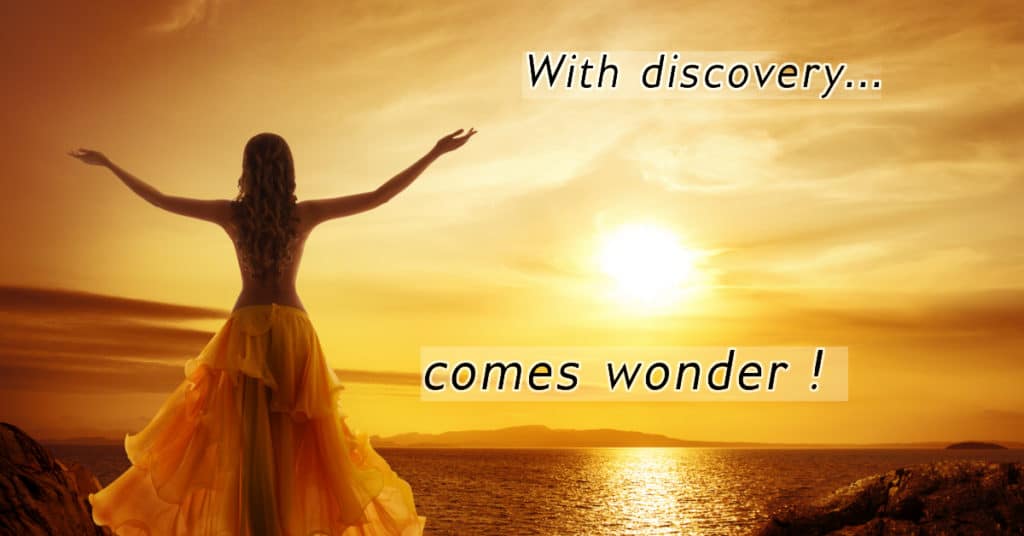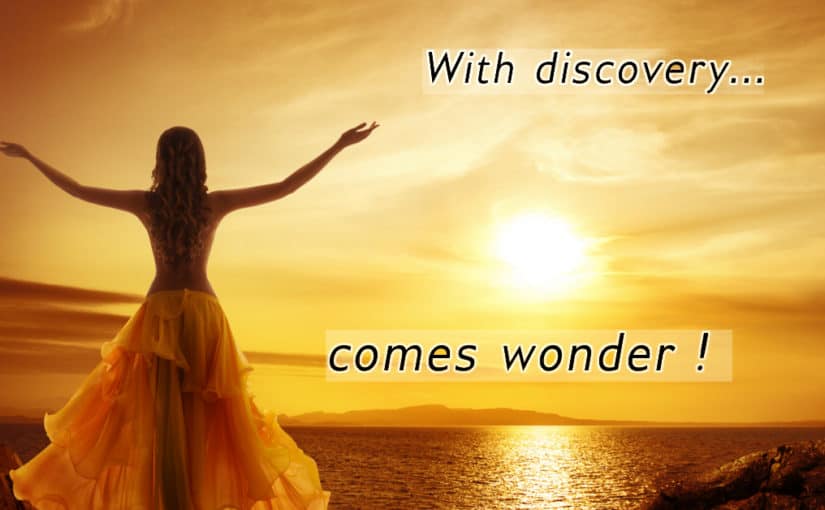 Wonder in a dictionary might say something like; the emotion aroused by something awe-inspiring, astounding, or surprising, but what does that mean for us?
Wonder in a dictionary might say something like; the emotion aroused by something awe-inspiring, astounding, or surprising, but what does that mean for us?
1. There can be no surprise without discovery.
Discovery is like a free fall; a new understanding of something previously taken for granted; a surprise affection, something beautiful or new knowledge. With discovery we are thrust into the moment. The experience is vitalizing, it awakens our senses. Think of a child who first sees a butterfly, they chase it, its colors are so beautiful, it’s dance is so erratic. We can envision the child laughing and even shouting with delight. If the butterfly flies away the child might burst into tears. That’s a part of discovery too. It’s not just children that discover. Our wonder might come as a dance, a beautiful song, a sunrise or a new friend or lover that thrusts us into the moment.
2. Discovery is vulnerable.
Discovery could also be risky. People feel scared of discovery and forget the part wonder plays in fun! Who or what inspires us to wonder? The chances are such people, places or events challenge us in new ways. If we do not inspire discovery in others, then why not? After all, the world is changing everyday. Even our body, every particle of it is different from what it was a moment before. The people we know we can meet anew and inspire wonder. Sadly we forget about this change and even deny it.
“People feel scared of discovery and forget the part wonder plays in fun!”
We can miss the wonder and vitality of discovery that would pull us out of our boring routines and imitation. What’s new seems scary sometimes, like climate change, we can pretend it’s not happening by generalizing from the past. The problem is not generalizing, but bad generalizing. Not everything orange is an orange. This kind of generalizing robs us of new knowledge; something different about the world, or ourselves, or another.
3. Wonder is part of a good life and without it we may feel not only bored but desolate.
We may rely on the vicariousness of a TV screen or smartphone to induce wonder when the experience is within our reach. We may use drugs to mitigate the boredom of routine. The universe, both inside and out, is bigger than our habits of mind. The less we have access to discovery, the more we’re confined by what we think we know. If we miss any wonder that life puts in our lap, then that is our own fault. If we think we know when we don’t, we pay a price for that hubris, we lose the wonder of discovery along with the vigor. We can’t help but view the world through our experience and that is useful, but that is not the problem. The problem comes when we face some new situation and our past does not apply or not well.
“It’s not that the wonder of the unknown isn’t all around us, it’s that we don’t see it.”
Wonder is so beautiful we may try to grasp what gives us wonder. But wonder is not an object and if we try to possess something or someone who inspires our wonder, we probably kill the wonder. We see this happen in relationships. It’s as if the child mentioned above wants to capture the butterfly. The wonder dies when the butterfly is kept under glass and impaled with a pin. It is not the same as the free-living thing it once was.
4. The wonder fueling our discovery helps survival by creating new adaptations in life.
This is a new day, we’ve never drawn this breath before. We are different now than we were yesterday and much different from what we were five years ago. It’s not that what is new isn’t all around us, it’s that we don’t see it. We don’t avail ourselves of what is new or changed. Then we miss what’s new, and if it is something really wonderful we may miss something that’s a part of a good life. Here is where quieting our mind becomes important because when the mind calms, we see the past does not bind us.
“If you do not expect the unexpected, you will not find it;
for it is hard to be sought out…”
–Heraclitus
If we want a life of discovery, we must see beyond the past. When we look beyond our past we also put aside our expectations. Why? Because expectations involve prediction, that means we think we know what the outcome will be. That is not discovery. Every advance in science must be willing to go beyond what was previously known. Since life is not a controlled experiment the experimenting in our life becomes an art. Through trial and error we test not the causes but the effects of discovery on ourselves and others. This requires courage. That is what we need for discovery and its wonder, the courage not only to admit we don’t know everything, but also the courage to not limit our judgment of new events by what we already know. Let’s find out what we’ve been missing. Let’s find our courage for a wonderful life.
